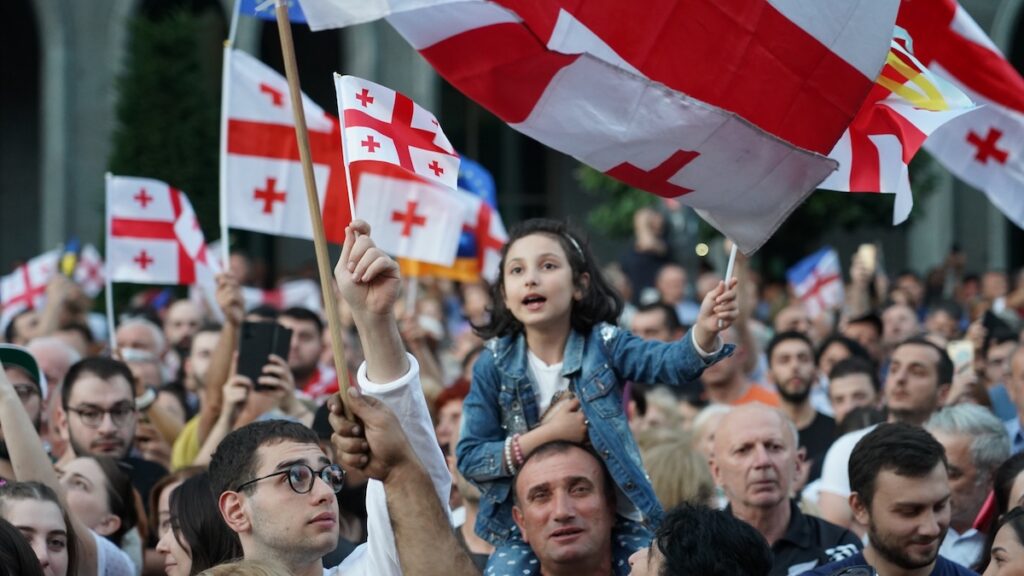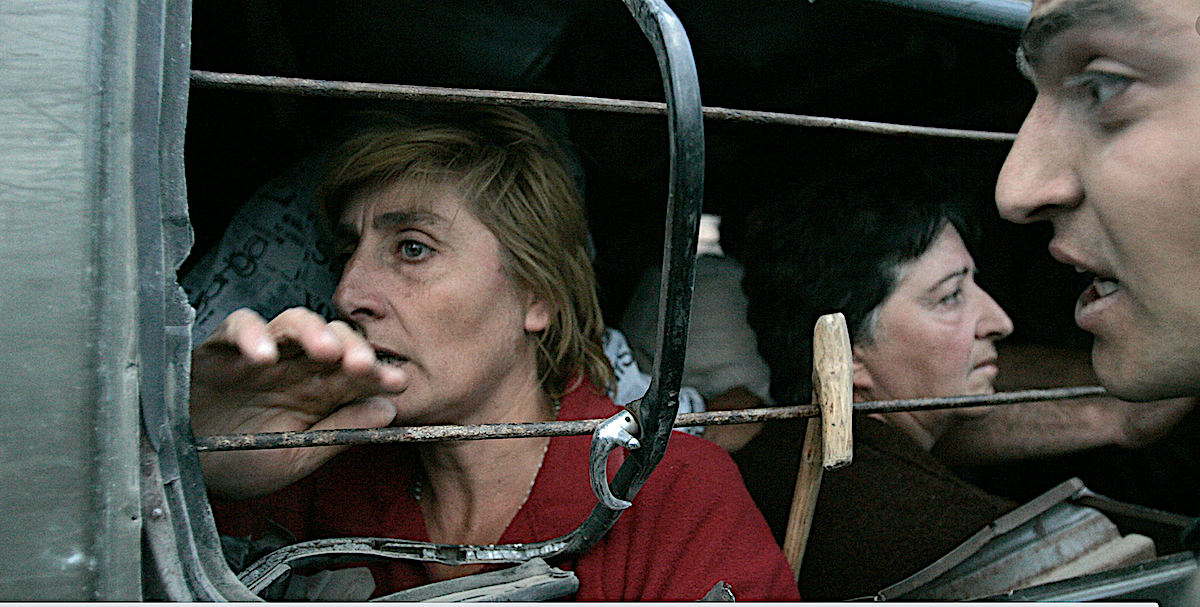34 years since Georgia restored independence: timeline of key events, 1991–2025
Key events since Georgia’s independence
On 9 April 1991, the former Soviet republic of Georgia declared independence. What path has the country taken since then?
Here are the key dates in Georgia’s modern history.
⬜ 1991 – Referendum, restoration of independence, first president
On 31 March 1991, a nationwide referendum was held with the question: “Do you support the restoration of Georgia’s state independence based on the Act of 26 May 1918?” Ninety-eight percent of eligible voters answered in favour.
On 9 April 1991, based on the referendum results, the Supreme Council of the Republic of Georgia declared the restoration of the country’s state independence. However, Independence Day continues to be celebrated on 26 May — the date originally proclaimed in 1918.
- What Azerbaijan, Armenia and Georgia did in 1918 when they became independent republics
- Georgia, the April 9 tragedy: the day the Soviet army cracked down on a peaceful demonstration in Tbilisi
On 26 May 1991, Georgia held its first presidential election since the restoration of independence. The newly independent country elected its first president — 52-year-old Zviad Gamsakhurdia, the leader of the national liberation movement.
In December 1991, armed confrontation broke out in Tbilisi between supporters of President Zviad Gamsakhurdia and, on the other side, the opposition and a rebellious faction of the army. The conflict resulted in significant casualties and destruction. Tanks rolled down Rustaveli Avenue in central Tbilisi, and the sound of shelling filled the air. Later, the epicentre of the civil conflict shifted to the Samegrelo region.
The civil war lasted for two years. It ended with the overthrow of the government and the exile of President Gamsakhurdia from Georgia, followed by his death. Power in the country was seized by a Military Council, which governed from 2 January to 10 March 1992 following the coup.
The council was composed of Jaba Ioseliani, Tengiz Kitovani, and Tengiz Sigua.
⬜ 1992 – Start of Shevardnadze era, Abkhaz war, and turbulent 1990s
In March 1992, at the invitation of the Military Council, Eduard Shevardnadze arrived in Georgia from Moscow. He took charge of the interim, unelected government — the State Council of the Republic of Georgia.
Later, in November 1995, Shevardnadze became the country’s second president, serving for 11 years. The 1990s were marked by criminal chaos, hunger, cold, poverty, and a deep crisis of statehood. Civil unrest, ethnic conflicts, and open Russian influence pushed Georgia to the brink of economic collapse and legal vacuum.
Shevardnadze’s return brought a degree of stability. However, the outdated governance model failed to tackle corruption, the entrenched elite, and the country’s international isolation. While Georgia’s pro-Western orientation existed in rhetoric, in practice the country remained dependent on Russian energy supplies and military presence.
On 14 August 1992, armed conflict broke out in Abkhazia. After the collapse of the Soviet Union, irreversible processes began in the Autonomous Republic of Abkhazia and the South Ossetian Autonomous Region — fuelled in part by Russia. Both regions demanded separation from Georgia. Fighting first erupted in South Ossetia (in 1990), and later in Abkhazia.
The armed conflict in Abkhazia began on 14 August 1992, lasted for 13 months and 13 days, and ended with the defeat of Georgian forces on 27 September 1993. The fall of Sukhumi on 27 September is one of the most tragic dates in Georgia’s history.
Victory was claimed by the Abkhaz forces, supported by Russia and allied North Caucasian fighters. Abkhazia ultimately declared independence from Georgia. However, neither Tbilisi nor the international community recognised the independence of Abkhazia or South Ossetia. To date, only five UN member states — including Russia — have done so.
The wars in Abkhazia and South Ossetia claimed tens of thousands of lives on both sides. As a result of the conflicts over the years, around 265,000 ethnic Georgians became internally displaced. The vast majority have still not returned to their homes.
⬜ 1993 – Georgia joins CIS, death of Zviad Gamsakhurdia
On 9 December 1993, Georgia joined the Commonwealth of Independent States (CIS), formed under Russia’s leadership. Many historians believe Eduard Shevardnadze was pressured into this move as a consequence of the war in Abkhazia.
Georgia later withdrew from the CIS Council of Defence Ministers on 3 February 2006, citing incompatibility with its officially declared goal of joining NATO.
On 31 December 1993, Zviad Gamsakhurdia died in the village of Khibula in the Khobi district — officially, by suicide. However, Gamsakhurdia’s allies and family have never accepted this version, believing that Georgia’s first president was assassinated.
⬜ 1995 – Constitution and presidential elections
On 24 August 1995, at 17:50, the Georgian parliament adopted the country’s Constitution with 159 votes in favour and 8 against.
On 5 November 1995, Georgia held its first elections since the adoption of the Constitution. Parliamentary and presidential elections took place on the same day. Eduard Shevardnadze’s party, the Union of Citizens of Georgia, won the vote, and Shevardnadze became the country’s second president.
⬜ 1998 – Baku–Tbilisi–Ceyhan
On 29 October 1998, Eduard Shevardnadze signed a declaration in Ankara launching the implementation of the Baku–Tbilisi–Ceyhan (BTC) oil pipeline project in Georgia. From a geopolitical standpoint, the pipeline’s main objective was to transport oil from Azerbaijan (and later Kazakhstan) to global markets independently of Russia.
It became the first oil pipeline in the CIS to bypass Russia and was built with direct involvement from the United States and the United Kingdom. With a significant share of oil now transported outside of Russian territory, the project marked a reduction in Moscow’s influence in the region.
⬜ 1999 – Georgia joins Council of Europe
On 27 April 1999, Georgia became a full member of the Council of Europe. “I am Georgian, therefore I am European!” — this phrase, spoken by then-Prime Minister Zurab Zhvania at the Council of Europe’s Parliamentary Assembly, remains a symbol of the country’s European identity and its aspiration to be part of the Euro-Atlantic community.
⬜ 2003 – Rose Revolution
In November 2003, following the fraudulent parliamentary elections held on 2 November, mass peaceful demonstrations erupted in Tbilisi against the government of Eduard Shevardnadze. Leading the opposition was 36-year-old Mikheil Saakashvili. A former justice minister under Shevardnadze, he had become a fierce critic of the government and exposed high-level corruption.
On 23 November, Saakashvili, along with other opposition leaders and their supporters, stormed the parliament building during its first session following the disputed election. That same evening, Shevardnadze announced his resignation, triggering a change in Georgia’s political leadership.
As Saakashvili entered parliament on 23 November, he held a red rose in his hand — a symbol of the peaceful nature of the protest. These events became known in Georgia and around the world as the “Rose Revolution.”
⬜ 2004 – New president, new flag, Adjara crisis and reforms
On 4 January 2004, Georgia held early presidential elections. The leader of the Rose Revolution, Mikheil Saakashvili, won by a landslide, securing 96 percent of the vote.
His campaign priorities included fighting corruption, reforming public services, implementing economic reforms, pursuing Euro-Atlantic integration, and restoring the country’s territorial integrity.
On 14 January 2004, the Georgian parliament adopted a new national flag featuring five crosses. Later that year, the parliament also approved a new national anthem and coat of arms. By government decree, the European flag was raised alongside the Georgian flag on the roofs of all government buildings.
- 20 Years Later: How is the Rose Revolution viewed in Georgia?
- Georgia’s Saakashvili in Ukraine – how did he change?
- What is Georgia’s ex-president tried for?
- Six questions about Saakashvili you wanted to ask Georgians
On 6 May 2004, Aslan Abashidze fled Batumi and went into exile in Russia. Following his departure, the Georgian government regained control over the Adjara region.
Aslan Abashidze was the de facto sole ruler of the Autonomous Republic of Adjara from 1991 to 2004. His relationship with Georgia’s central government was consistently strained, and he was often referred to as the “feudal lord of Adjara.”.
Following the Rose Revolution, Abashidze effectively removed the region from the jurisdiction of the central government, leading to a sharp confrontation with the new leadership..
After the Rose Revolution, Georgia’s new government of young reformers launched a comprehensive reform of the public sector. The police reform was widely regarded as the most successful.
In July 2004, the traffic police department was dissolved. For an entire month, there were no traffic officers on Georgian roads. A public media campaign was then launched to recruit new officers, with women making up 15% of the recruits.
The new officers were offered a monthly salary of $450 — a stark contrast to the $30 received by their predecessors.
A total of 2,467 men and women who passed the selection process were enrolled in two-week training courses and issued new uniforms bearing their names. Instead of the Soviet-era Makarov pistols, they were equipped with Israeli-made Jericho handguns.
In August 2004, the new patrol police officially began work. Crime rates across the country dropped sharply, and police bribe-taking came to a halt.
At the same time, many experts and international organisations criticised the government for using illegal and abusive methods in its fight against crime, with repeated reports of widespread human rights violations.
⬜ 2005 – Death of Zurab Zhvania, Bush’s visit to Georgia
On 3 February 2005, Georgian Prime Minister Zurab Zhvania was found dead. According to the official version, he died from carbon monoxide poisoning caused by a faulty gas heater, though his family has never accepted this explanation.
On 9 May 2005, U.S. President George W. Bush arrived in Tbilisi as part of his European tour. On 10 May, Bush and President Mikheil Saakashvili addressed tens of thousands of people gathered on Freedom Square in the capital.
This was the first — and so far only — visit by a sitting U.S. president not only to Georgia, but to the entire Caucasus region. The visit carried both symbolic and strategic weight — serving as a geopolitical signal to Russia and a strong show of support for Georgia’s pro-European direction.
⬜ 2006 – The Sandro Girgvliani case
On 28 January 2006, 28-year-old Sandro Girgvliani, head of the international relations department at United Georgian Bank, was found dead with multiple injuries near Tbilisi. The case became one of the most high-profile in Georgia’s modern history.
Shortly before his death, Girgvliani had a confrontation with senior officials from the Ministry of Internal Affairs at a bar in central Tbilisi. The case involved the wife of then–Interior Minister Vano Merabishvili and other high-ranking ministry officials.
The murder of Sandro Girgvliani and the mishandling of the investigation significantly damaged the reputation of the ruling United National Movement party.
⬜ 2007 – Violent dispersal of 7 November protest
On 7 November 2007, the authorities used force to disperse a peaceful opposition rally in Tbilisi. That same day, special forces stormed the offices of the Imedi TV channel, which was owned by Georgian oligarch Badri Patarkatsishvili.
The government claimed that the opposition, with the help of Patarkatsishvili and Russian intelligence services, was plotting a coup. A state of emergency was declared in the country.
In an attempt to defuse the crisis, President Saakashvili called early presidential elections for January 2008. He was re-elected for a second term.
⬜ 2008 – Bucharest Summit and the August war
On 3 April 2008, a NATO summit was held in Bucharest, where Georgia was denied entry into the Membership Action Plan (MAP), a key step towards joining the alliance. However, both Georgia and Ukraine were given assurances that they would eventually become NATO members.
Following the summit, Russia repeatedly demanded the reversal of this promise made to Georgia and Ukraine.
On 7 August 2008, the Russia–Georgia war over South Ossetia began. The conflict lasted five days and resulted in the deaths of hundreds of people, including civilians.
It was the first war on European soil in the 21st century. As a result of the conflict, Georgia lost control over parts of Abkhazia and South Ossetia. Thousands of ethnic Georgians became internally displaced.
On 26 August 2008, Russia recognised the independence of Abkhazia and South Ossetia.
⬜ 2012 – Beginning of Georgian Dream era
On 1 October 2012, the Georgian Dream coalition, founded by billionaire Bidzina Ivanishvili, won the parliamentary elections, ending nine years of rule by the United National Movement and bringing a new government to power.
It marked the first time in Georgia’s post-independence history that power changed hands peacefully through elections.
A year later, in the 2013 presidential election, Giorgi Margvelashvili — the candidate backed by Georgian Dream — was elected as the country’s fourth president, marking the full transfer of political power to the former opposition.
Bidzina Ivanishvili’s coalition replaced nine years of Mikheil Saakashvili’s rule, a period associated with rapid reforms but also with serious allegations of human rights violations.
The new government’s main pledge was to restore justice and ensure the proper functioning of the judicial system.
⬜️ 2013 – Day of Family Purity and attacks by far-right groups
On 17 May 2013, groups of homophobic citizens — including members of the clergy — formed what became known as “hate groups” and attacked people who had gathered in central Tbilisi with LGBT rights activists to mark the International Day Against Homophobia. The violence turned into a brutal assault; dozens were injured, and participants had to be evacuated under police protection.
Since 2014, by decree of the Catholicos-Patriarch of All Georgia, 17 May has been declared the Day of Family Purity. In 2024, the ruling Georgian Dream party officially added it to the national holiday calendar and made it a public day off.
⬜ 2014 – Association agreement with European Union
On 27 June 2014, Georgia signed an Association Agreement with the European Union — a milestone document on the country’s path toward European integration. The Association Agreement is the EU’s main tool for bringing countries involved in the Eastern Partnership closer to EU standards and norms.
⬜ 2015 – Tbilisi flood
On the night of 13 June 2015, heavy rainfall caused the Vere River in Tbilisi to overflow. The flood claimed 22 lives and left 154 families homeless. Homes and cars were swept away, the city zoo was submerged, and wild animals that had escaped their enclosures were seen roaming through central Tbilisi.
⬜ 2017 – Visa-free travel with Europe and “cyanide case”
At 04:22 on 28 March 2017, a flight departed from Tbilisi International Airport bound for Poland, carrying the first passengers to travel to Europe without a visa. Visa-free entry to the European Union for Georgian citizens officially came into effect that day.
In February 2017, Father Giorgi Mamaladze, an archpriest, was arrested at Tbilisi Airport and charged with “preparing the murder of a high-ranking cleric.”
According to investigators, he had planned to poison Shorena Tetruashvili — a powerful personal secretary to the Catholicos-Patriarch of All Georgia, Ilia II — using cyanide.
The case became known as the “Cyanide Case” and exposed deep issues within one of Georgia’s most powerful and opaque institutions: the Church.
- Cyanide case. A real attack or the Patriarchate’s court games?
- Capital of the Patriarchate: Property of the most influential institution in Georgia
- Anti-vaxxing, homophobia, pro-Russian sentiments – is the church an obstacle on Georgia’s pro-Western course?
⬜ 2018 – Fifth president
On 28 November 2018, in the second round of the presidential election, 66-year-old Salome Zurabishvili was elected as Georgia’s fifth president. Her candidacy was supported by the Georgian Dream party. Zurabishvili became the last president to be elected by direct public vote. Under constitutional amendments, future presidents are chosen by an electoral college.
⬜ 2019 – “Gavrilov night”, Rustavi 2 scandal, and political crisis
20 June 2019 became a key date in Georgia’s modern political calendar. On that day, large-scale anti-government protests broke out, triggering a political crisis that, in various forms, continues to this day.
- Gavrilov Night’s anniversary – how June 20 became symbol of violent opposition crackdown back in 2019
- She lost her eye at a rally in Tbilisi, but she will continue to protest. Why? – video
On 20 June, thousands of people took to Rustaveli Avenue after Russian State Duma deputy Sergei Gavrilov was spotted sitting in the speaker’s chair of the Georgian parliament. Gavrilov had arrived in Tbilisi to take part in the Interparliamentary Assembly on Orthodoxy.
Georgian citizens were outraged that the session, held inside the national parliament, had been opened by a Russian MP. Gavrilov took the speaker’s seat and addressed the audience in Russian.
Tens of thousands of protesters gathered outside the parliament building, demanding: “What is a deputy from an occupying country doing in the speaker’s chair of the Georgian parliament?”
In the early hours of 21 June, police special units dispersed the protest using tear gas and rubber bullets. More than 200 people were injured, and two lost an eye.
On 18 July 2019, the European Court of Human Rights in Strasbourg issued its ruling on the case of Rustavi 2, Georgia’s most popular opposition television channel. The channel changed ownership and was handed over to pro-government businessman Kibar Khalvashi.
Thus, a nearly four-year legal battle over Rustavi 2 — initiated by the government — ended in its favour. The Strasbourg court’s decision marked the start of a new media reality in Georgia and significantly shifted the media landscape in favour of the ruling party.
⬜ 2020 – Pandemic, July 5 attacks on journalists, "Cartographers’ Case", and Charles Michel’s visits
On 31 October 2020, Georgia held parliamentary elections, the results of which were rejected by the opposition, who refused to take their seats in parliament. Protests began, demanding new elections.
Western diplomats and senior EU officials, particularly European Council President Charles Michel, became involved in efforts to de-escalate the crisis. Michel personally visited Georgia three times.
With his mediation, a document was drafted to help resolve the deadlock.
On 19 April 2021, the “Charles Michel Agreement” was signed. The opposition agreed to enter parliament, while the government pledged to initiate electoral and judicial reforms. However, the deal eventually collapsed when the ruling party unilaterally withdrew from it on 28 July.
On 5 July 2021, several hundred homophobic individuals — including many members of the clergy — stormed the Tbilisi Pride office, tore down the EU flag flying outside the parliament building (framing the West as pushing “gay propaganda”), and violently attacked journalists covering the events.
Around sixty media workers were injured. Among them was Lexo Lashkarava, a cameraman for the TV channel Pirveli, who was brutally beaten. He died several days later.
Amnesty International stated that the authorities failed to take adequate action to stop the violence. None of the organisers or perpetrators of the 5 July attacks were arrested.
On 26 February 2020, Georgia confirmed its first case of COVID-19. A state of emergency was declared on 21 March, followed by a nationwide lockdown and curfew on 30 March.
In total, the pandemic claimed 17,132 lives in the country. Georgia ranks eighth globally in COVID-19 deaths per million inhabitants.
On 7 October 2020 — just three weeks before the parliamentary elections — the Prosecutor’s Office launched a case concerning the alleged illegal handover of territory near the Davit Gareji monastery to Azerbaijan. Two cartographers, Iveri Melashvili and Natalia Illicheva, were arrested and accused of concealing an important map and, as a result, ceding territory to Azerbaijan under orders from the Saakashvili government.
The map that triggered the investigation was brought from Moscow and handed to the Georgian Prosecutor’s Office by David Khidasheli, a businessman based in Russia and known to have close ties to Bidzina Ivanishvili.
Independent experts stated that the case lacked evidence. The opposition and human rights groups condemned it as political retribution aimed at discrediting the United National Movement and Mikheil Saakashvili ahead of the election.
The government’s campaign titled “Gareji is Georgia” was widely seen by civil society as a ploy to stir patriotic sentiment among voters.
2021 – PM Gakharia joins opposition, Saakashvili returns and gets arrested
On 18 February 2021, Prime Minister Giorgi Gakharia — once seen as one of Bidzina Ivanishvili’s closest allies — unexpectedly resigned from his post. He cited his disagreement with the use of force to arrest Nika Melia, the chairman of the main opposition party, the United National Movement.
Soon after his resignation, Gakharia founded his own political party, which has since become one of the most viable opposition forces in Georgia.
On 1 October 2021, after eight years in exile, Georgia’s third president, Mikheil Saakashvili, secretly returned to the country despite being wanted by the ruling Georgian Dream party. He was arrested just hours after his arrival.
In October 2025, it will be four years since his imprisonment. In total, Saakashvili has been sentenced to 12 years and 6 months in prison.
⬜ 2022 – Georgia and war in Ukraine, arrest of Mtavari Arkhi director
On 28 February 2022, amid Russia’s full-scale invasion of Ukraine, Georgian Prime Minister Irakli Garibashvili claimed that certain forces — including the “radical opposition” — were attempting to drag Georgia into the war.
Since then, this claim has become one of Georgian Dream’s central propaganda narratives — despite thousands of Georgian volunteers fighting on Ukraine’s side.
On 16 May 2022, the director of the opposition Mtavari Arkhi TV channel, Nika Gvaramia, was arrested. He became the first media manager, TV presenter, and co-owner of an opposition channel in Georgia’s modern history to be sentenced to prison.
He was handed a 3-year and 6-month sentence for alleged financial damage to Rustavi 2 — the TV channel he previously ran — primarily over the personal use of a company car.
International human rights organisations condemned the case as politically motivated. The Committee to Protect Journalists included Georgia, for the first time, in its list of countries where journalists are jailed for their work.
Gvaramia was pardoned by the president and released from prison in June 2023.
In spring 2022, tens of thousands of Russian citizens fleeing mobilisation formed long queues at Georgia’s Upper Lars border crossing. They came to settle in a country of which 20% is occupied by Russia.
According to official statistics, around 113,000 Russian citizens who entered Georgia in the first nine months of 2022 remained in the country. As of 1 November 2022, Russian nationals held 2.4 billion lari (around $1 billion) in Georgian bank accounts. Between January and November 2022, over 10,000 Russian citizens registered new businesses in Georgia.
⬜️ 2023 – Foreign Agent law, Shovi tragedy, China ties and EU candidate status
On 2 March 2023, mass protests erupted in Tbilisi against the proposed Law on Transparency of Foreign Influence, introduced by the Georgian Dream-affiliated parliamentary group People’s Power. The initiative was immediately dubbed the “Russian law” by the public, as it resembled legislation used by the Kremlin to suppress civil society and independent media.
In response to the protests, which drew tens of thousands into the streets of central Tbilisi, the authorities used water cannons and tear gas. Amid mounting pressure, the government backed down and withdrew the bill on 9 March.
On 3 August 2023, at around 3 p.m., a massive landslide struck the Shovi resort in the mountainous Racha region. In just minutes, a torrent of mud and debris engulfed the entire resort and surrounding area. The overflowing river destroyed bridges, cars, and parts of the forest. The landslide claimed 33 lives, flattened the once-popular resort, and raised serious questions about the preparedness and effectiveness of the country’s emergency services.
In July 2023, Georgia and China signed a strategic partnership agreement. Amid worsening relations with the West, the ruling Georgian Dream party has been rapidly deepening ties with China. Notably, the government granted Chinese companies — some of which are under U.S. sanctions — the right to construct the strategically important Anaklia deep-sea port.
- Georgia and China: Advantages and risks of friendship
- Georgia’s double game: European integration and Chinese investments
- Anaklia: The port of the future stuck in the political quagmire of the present
- Georgian tea with Chinese twist: Why are entrepreneurs from China so interested in Georgia?
Since 11 September 2023, Georgia has operated a visa-free regime for Chinese citizens. By 2024, the number of registered Chinese businesses in the country had risen by 96.6%, reaching a historic high. Georgia’s shift to a new level of cooperation with the world’s second-largest economy was met with mixed reactions at home. Some viewed it as a turn away from the West.
On 14 December 2023, at a European Council summit, Georgia was granted candidate status for EU membership. However, the country was tasked with meeting nine conditions. Among them was a new requirement: Georgia must align its overall foreign and security policy with that of the European Union.
⬜️ 2024 – Elections, repressive laws, pro-European protests and political prisoners
On 14 May 2024, despite mass protests and strong criticism from the West, the Georgian parliament passed the reintroduced “foreign agent” law. The vote count was 84 in favour, 30 against. At the same time, Georgian Dream leaders escalated attacks on the country’s Western partners and incited hatred and violence against political opponents.
On 26 March 2024, Georgia’s national football team made history by qualifying for the UEFA European Championship for the first time, defeating Greece in a dramatic penalty shootout. At Euro 2024, Georgia played four matches and reached the Round of 16.
On 17 September 2024, parliament passed a discriminatory and homophobic law targeting the LGBT community. Backed by 84 MPs, the law mirrored similar legislation in Russia. Six months before the parliamentary elections, Georgian Dream pushed forward a series of bills that legal experts and international observers described as a rollback of democratic standards.
Parliamentary elections held on 26 October 2024 were widely described as historic and decisive. For the first time, they were conducted entirely under a proportional system and largely via electronic voting. For many, the elections served as a de facto referendum — a chance for pro-European voters to return the country to a Euro-Atlantic course.
However, widespread irregularities before and during election day cast doubt on the legitimacy of the results. The opposition and much of civil society refused to recognise the outcome, and the majority of Georgia’s Western partners did not congratulate Georgian Dream on its victory.
On 28 November 2024, Prime Minister Irakli Kobakhidze of Georgian Dream announced that Georgia would suspend its EU integration process until 2028. That evening, mass protests broke out in Tbilisi and other cities — and have continued as of this publication date [26 May 2025].
Initially, police used force against demonstrators, deploying water cannons, tear gas, and pepper spray. Hundreds of protesters were brutally beaten. Human rights groups described the police violence — including assaults and thefts from demonstrators — as acts of torture.
On 30 November 2024, two days after Kobakhidze’s EU statement, the U.S. State Department announced the suspension of its strategic partnership with Georgia.
For the first time in its history, Georgia’s government came under sanctions from Western partners — including the United States and EU member states. Sanctions targeted senior officials, judges, MPs, businesspeople, and other figures associated with Georgian Dream.
On 29 December 2024, the inauguration of Georgia’s sixth president, Mikheil Kavelashvili, took place in the parliamentary chamber. Kavelashvili, appointed by the ruling Georgian Dream party, became the first president in Georgia’s history not to be elected by public vote. His nomination was approved by an electoral college on 14 December.
The opposition, civil society, and a significant portion of the international community do not recognise the results of the 26 October parliamentary elections. They consider the 11th Parliament, along with the government, the president, and other structures it has appointed, to be illegitimate.
⬜️ 2025 – FARA and other anti-Democratic laws, arrest of Mzia Amaghlobeli, and political repression
In 2025, Georgian Dream continued its policy of distancing the country from the West, pushing through a series of anti-democratic laws — including the so-called FARA (Foreign Agents Registration Act), a grant law, a bill banning certain political parties, and restrictions on freedom of assembly. These new laws have made it nearly impossible for independent media, civil society, and dissenting voices to operate in Georgia.
On 11 January 2025, Mzia Amaghlobeli — founder of the prominent media outlets Batumelebi and Netgazeti — was arrested for slapping Batumi police chief Irakli Dgebuadze. She now faces up to seven years in prison.
On 22 May 2025, Zurab (Girchi) Japaridze, one of the country’s leading opposition figures, was also arrested.
In response, Western governments have warned of sanctions and begun taking concrete steps. The Trump administration labelled the Ivanishvili government “anti-American.” On 6 May, the U.S. House of Representatives passed the MEGOBARI Act, which provides for sanctions against members, allies, and family members of the Georgian Dream leadership.
- Arrests of opposition politicians in Georgia and Georgian Dream’s investigative commission – what next?
- How special forces beat protesters in Tbilisi: stories from those hospitalized
Mass, continuous protests are ongoing on Rustaveli Avenue in Tbilisi. More than 50 political prisoners — detained by the Georgian Dream government during various pro-European rallies — remain behind bars.

Новости в Грузии






















